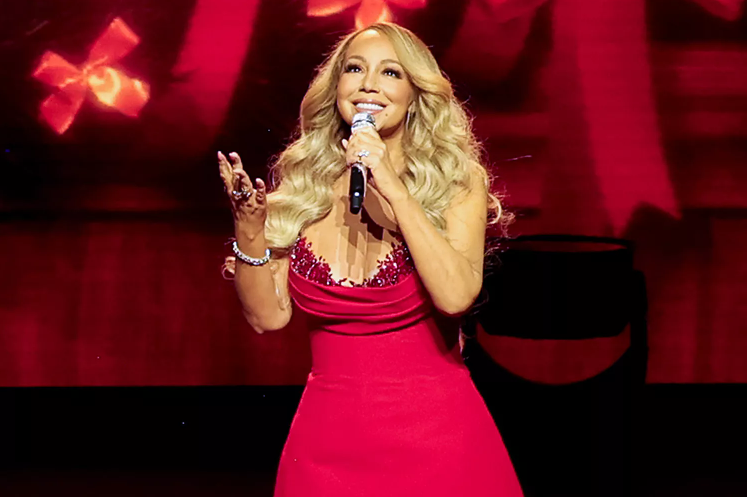Music
Mariah Carey Responds to Spotify Wrapped Video Backlash: No AI, Just Bad Lighting
1. The Spotify Wrapped Video Controversy: Why It Went Viral
Spotify Wrapped has become an annual tradition for music lovers, artists, and fans alike. The platform’s recap video serves as a celebration of the music that shaped the year, with personalized clips showcasing the listener’s most played songs and artists. This year, however, the inclusion of Mariah Carey in the Wrapped video sparked an unexpected wave of reactions.
The video’s lighting and aesthetic choices, featuring Carey in a dimly lit setting, seemed off to some fans. The angle, lighting, and even the appearance of Carey’s face led to questions about whether AI tools were used to enhance or modify her image. Social media quickly exploded with theories about AI, with many pointing out the unusual appearance of Carey’s skin tone and facial features. The rumors intensified, with some jokingly suggesting that her infamous red lip—often associated with her classic glam look—was to blame for the “strange lighting.”
These discussions, however, went far beyond simple fan chatter. They captured attention across mainstream media outlets, with numerous articles picking up on the debate. As the rumors swirled, many questioned whether the music industry was starting to rely too heavily on AI-generated content. The idea of AI-assisted visuals and music content has been a growing conversation, especially following the increasing use of AI technology in music production, deepfake videos, and content creation. As a result, Mariah Carey found herself at the center of a media storm, with her fans eager for clarification on whether technology was behind her video appearance.

2. Mariah Carey’s Response: “No AI, Just Bad Lighting”
After a flurry of speculation, Mariah Carey took to social media to address the growing controversy surrounding her appearance in the video. In a typically playful and direct response, Carey denied any use of AI technology, instead attributing her appearance to “bad lighting” during the shoot. Her post was lighthearted, with the diva using humor to disarm her critics. Carey made it clear that she had not relied on artificial intelligence for her appearance, instead pointing out that the red lip and poor lighting simply led to an unflattering look.
Carey’s witty response immediately went viral, with fans and media outlets alike praising her for handling the situation with humor and grace. By addressing the controversy directly, she effectively ended the speculation and restored her image, reminding everyone that her iconic persona was all-natural. Carey’s acknowledgment that the video was not the best lighting for her didn’t detract from her star power; rather, it showcased her ability to laugh at herself while keeping her fans engaged.
The playful, tongue-in-cheek tone of Carey’s response may have helped diffuse the situation, but it also brought up an important issue: the role of AI in modern entertainment. Mariah Carey, a seasoned and self-assured artist, showed no hesitation in rejecting the notion that her appearance was manipulated by technology. Her statement highlighted the growing discomfort many artists and fans feel regarding AI technology’s influence on the creative process, whether in music, visuals, or even live performances.
3. The Rise of AI in the Music Industry: Opportunities and Concerns
The controversy surrounding Carey’s Spotify Wrapped video is part of a larger discussion about the role of AI in the entertainment industry, especially within music. Over the past few years, AI technology has made its way into various aspects of music production, from song creation to album artwork. AI tools have been employed to generate realistic vocal performances, create new beats, and even remix existing songs. Some artists have expressed excitement over AI’s potential to unlock new creative possibilities, while others are more skeptical of its use.
In the case of Carey’s video, the speculation about AI arose at a time when the music industry is grappling with AI’s growing presence. Many see AI as a tool that can democratize music creation, allowing anyone with access to technology to produce high-quality tracks. Yet, there are legitimate concerns about the authenticity of AI-generated music and whether it can replicate the emotional depth and human touch that artists like Mariah Carey bring to their craft.
Moreover, the question of AI’s involvement in visual content raises another issue: digital manipulation. Deepfake technology, which uses AI to create realistic videos of individuals performing actions they never did, has been used to alter appearances in media. While deepfakes have mostly been used in controversial and harmful ways, the entertainment industry is increasingly using AI to modify or enhance visual content. The debate over how much of an artist’s image is authentic versus computer-generated is one that Mariah Carey inadvertently found herself embroiled in with her Wrapped video.
Carey’s denial of AI usage in her video serves as a reminder of the larger ethical discussions surrounding the use of AI in the arts. For some, the use of AI is seen as a threat to creativity and artistic integrity. As AI continues to evolve, it raises important questions about the line between human artistry and machine-generated content. Whether artists like Carey embrace AI or resist it, one thing is clear: the role of AI in music and media is only going to expand, and the conversation surrounding its influence will continue to grow.
4. Mariah Carey’s Legacy: Staying True to Herself in the Age of Digital Manipulation
Mariah Carey has spent more than three decades in the music industry, earning a reputation as one of the greatest vocalists of all time. Known for her five-octave vocal range and her indelible impact on pop and R&B music, Carey’s legacy is firmly rooted in authenticity. She has consistently maintained a strong, independent identity, often pushing back against industry pressures to conform to conventional standards of beauty, music, and celebrity culture.
Her response to the Spotify Wrapped controversy is just another example of Carey’s unwavering commitment to staying true to herself, even in the face of digital manipulation. In an era where social media influencers and celebrities often feel the pressure to conform to digital trends, Carey’s refusal to let AI or bad lighting define her is a powerful statement about the importance of authenticity in the digital age.
Carey has long been a pioneer in using technology to enhance her music, from her early collaborations with producers to her cutting-edge music videos. Yet, her career has always been about more than just technology—it’s been about the raw power of her voice, her artistry, and her ability to connect with audiences on a deeply emotional level. Whether it’s belting out holiday classics or sharing her personal journey, Carey has built a career on vulnerability and authenticity.
In rejecting the use of AI in her Spotify Wrapped video, Carey underscores the value of human connection in art. While AI can enhance and facilitate the creative process, it cannot replace the unique perspective and emotional depth that an artist like Carey brings to the table. For her, authenticity will always remain more important than the illusions created by technology.
5. The Future of Music and Media: Mariah Carey’s Influence on the Digital Era
As the debate over AI and digital manipulation continues to evolve, Mariah Carey’s influence on the music and media landscape remains undeniable. Despite the rise of social media, streaming services, and AI technology, Carey has managed to maintain her place at the forefront of pop culture, constantly redefining what it means to be a successful artist in the digital age.
Carey’s response to the Spotify Wrapped video controversy exemplifies her ability to adapt to the ever-changing media landscape while remaining grounded in her identity. She has never shied away from addressing public perceptions of her, whether it’s discussing her personal life or navigating her public image. In the age of digital manipulation and AI, Carey’s response is a reminder that, at the heart of it all, it’s the artist’s voice and vision that should matter most.
As the music industry becomes increasingly digitized, the lines between human artistry and machine-generated content will likely continue to blur. Yet, with Mariah Carey continuing to push boundaries and stay true to herself, she serves as a beacon for artists who wish to retain control over their narratives in an ever-evolving world. The future of music may involve AI-assisted creations, but it will always need the unique magic of human creativity that artists like Carey provide.
From: Doublejoydesigns
